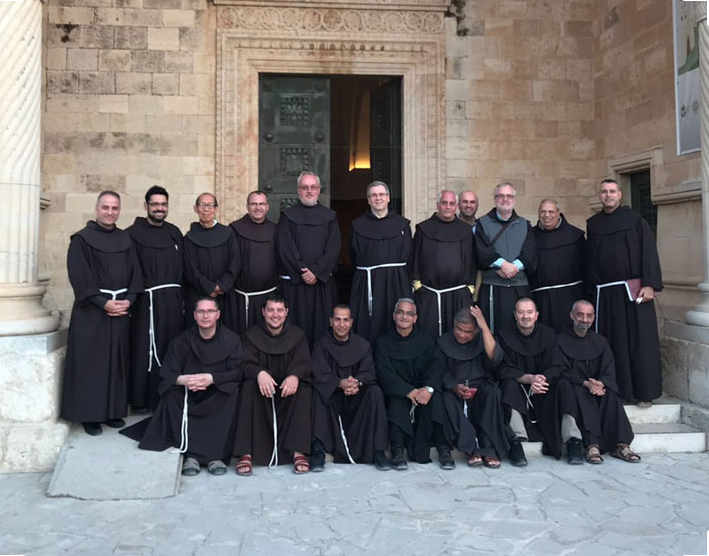Two days to work for the parishes of the Holy Land and share their experiences as shepherds: Pastors of the parishes of the Custody of the Holy Land met at the end of October at the Mount Tabor monastery in Galilee, as foreseen by the three-year program for permanent formation that provides support to pastors. The meetings were held on the initiative of the Moderator for Permanent Formation of the Custody of the Holy Land, Fr. Marcelo Cichinelli, and the Secretary for Missionary Evangelization of the Custody, Fr. Abdel Masih Fahim, who is also the pastoral coordinator. These were two intense days that included the participation of the Vicar of the Custody of the Holy Land, Fr. Dobromir Jasztal, and of the Custos of the Holy Land, Fr. Francesco Patton.
Discussion of the diocesan pastoral program, such as the apostolate for the family, and how to attract families to evangelize within the parish, were discussed. “The activities of the pastors must cover the fields of caring, sanctifying and teaching,” said Fr. Abdel Masih Fahim. “For these days, we have chosen to look more deeply at the aspect of caring. The pastor, in fact, is not just a priest but is also a shepherd who has to be interested in everyone: young and old, poor and rich, healthy and sick, families in crisis.”
Fr. Dobromir recalled the law of the Order and of the Church for the role of the pastor and thus addressed the issue from the perspective of Canon Law and the general constitutions of the order. There was then a divine Lectio through the re-reading of a piece from the Gospel of John.
Fr. Patton, during the second day of the meetings, spoke about the relationship between being a Franciscan friar and being a pastor in the context of a brotherhood. It must be remembered that the parish mission is entrusted to a province of the order, that the province entrusts it to a specific brotherhood, and the pastor is one of the friars who has a specific role. The Custos spoke about the role of the pastor in relation to his life of prayer and to his participation in his Franciscan life; he also spoke about the Franciscan spirit of leading a parish.
An important moment was the Eucharist, which was presided over by the Custos, in which everyone prayed for the evangelization of all people and for those who were sent among the peoples to proclaim the Gospel, as the Custody has done in its 800 years of existence.
Many topics were discussed, as Fr. Marcelo Cichinelli confirmed, “Pastoral care, young people, how to help people return to the sacraments, how to improve catechesis for children, how to make family participation in Sunday mass more engaging, how to involve lay people and religious so that the parish can continue to be the evangelizing center of the church.”
A great sense of communion united the participants when the time came to share their personal experiences in the parish. “The fervor of the participants and their way of facing challenges in different places show us that we can learn from each other, because each parish has its own [unique] characteristics,” said Fr. Abdel Masih Fahim.
Fr. Abdel Masih Famih is also pastor of the Ramleh parish and for this reason he found it helpful to meet with other pastors: “I personally was very pleased to meet my confreres, to live together for two days and to listen to everyone’s experiences. I especially appreciated the topics that were presented by the Father Custos and the Custodial Father Vicar.”
Ramleh has a small parish of about 1,400 faithful of the Latin rite, who live in a context of 4,000 total Christians, 16,000 Muslims, and 53,000 Jews. “We lead activities, especially with children and young people,” explained Fr. Abdel. “Here I saw how they live in peace together without any major political problems. This does not mean that there are no challenges, especially with children and young people who attend government schools and who do not know Arabic well.” Which Bible must these children read? And which mass should they attend? These are just some of the questions asked by the pastor of Ramleh and he is not the only one [asking them]. The pastors of the Custody of the Holy Land continue to work day after day, year after year, to serve the parishes with attention, charity and care, so as to never lose any sheep.
Beatrice Guarrera


